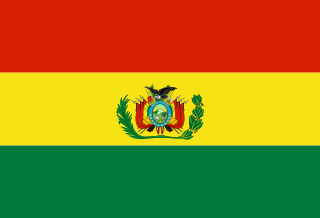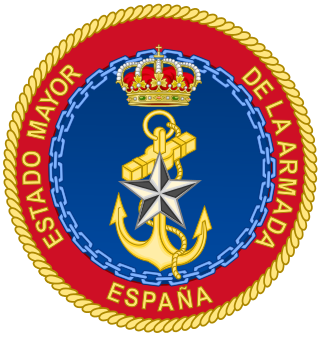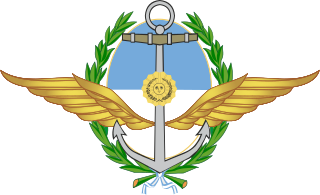
Honduras is a member of the United Nations, the World Trade Organization (WTO), the Central American Parliament (PARLACEN), the Central American Integration System (SICA), and the Central American Security Commission (CASQ). During 1995–96, Honduras, a founding member of the United Nations, for the first time served as a non-permanent member of the United Nations Security Council. Honduras is also a member of the International Criminal Court with a Bilateral Immunity Agreement of protection for the US-military.

The Bolivian Armed Forces are the military of Bolivia. The Armed Forces of Bolivia are responsible for the defence, both of external and internal, of Bolivia and they are constituted by Bolivian Army, the Bolivian Air Force and the Bolivian Navy. All these institutions depend on the Ministry of Defence of this country.

The 2009 Honduran constitutional crisis was a political dispute over plans to hold a popular referendum to either rewrite the Constitution of Honduras or write a new one.

The Supreme Court of Honduras is the Supreme Court and Constitutional Court of Honduras. The Supreme Court is the highest judicial authority in Honduras.
The 2009 Honduran constitutional crisis was a political confrontation concerning the events that led to, included, and followed the 2009 Honduran coup d'état and the political breakdown associated with it. The coup was repudiated around the globe, but Roberto Micheletti, head of the government installed after the coup, has claimed that the Honduran Supreme Court ordered the detention of Manuel Zelaya, deposed President of Honduras, and that the following succession was constitutionally valid.

The 2009 Honduran coup d'état, which took place during the 2009 Honduran constitutional crisis, occurred when President Manuel Zelaya failed to follow the Honduran Supreme Court ruling. On 28 June 2009, the Honduran Army ousted him and sent him into exile. Zelaya had attempted to schedule a non-binding poll to hold a referendum on convening a constituent assembly for writing a new constitution. Despite court orders to cease, Zelaya refused to comply, and the Honduran Supreme Court issued a secret arrest warrant dated 26 June. Two days later, Honduran soldiers stormed the president's house in the middle of the night, detained him, and thwarted the poll. Instead of putting him on trial, the army put him on a military plane and flew him to Costa Rica. Later that day, after reading a resignation letter of disputed authenticity, the Honduran Congress voted to remove Zelaya from office and appointed Head of Congress Roberto Micheletti, his constitutional successor, to complete his term. This was the first coup to occur in the country since 1978.

Rafael Pineda Ponce was a Honduran professor and politician in the Liberal Party of Honduras and President of the National Congress of Honduras from 1998 to 2002.
The Honduran fourth ballot box referendum was a planned non-binding referendum by Honduran president Manuel Zelaya to gauge public opinion on a second, binding referendum aimed at convening a constitutional assembly. The referendum would have run concurrently with the November 2009 presidential, congressional, and mayoral elections. Some Hondurans opposed the plan, including many politicians from the two largest parties. When Zelaya pushed ahead with plans for this referendum on whether to include a fourth ballot box, the Supreme Court issued a warrant for his arrest and the army expelled him from the country in a coup d'état on June 28, precipitating the 2009 Honduran constitutional crisis.
Public opinion on the 2009 Honduran coup d'état is divided in Honduras. There are three known opinion polls on the 2009 Honduran constitutional crisis. The polls show polarized Honduras. The first CID-Gallup showed support for President Manuel Zelaya's removal from office because of his actions but not the manner in which it was carried out. Subsequent opinion polls showed higher levels of opposition to the events of the coup, though the opinion of the government it inaugurated was more evenly mixed. According to the latest poll in October, only 48% of Hondurans regard Roberto Micheletti's performance as good or excellent, and 50% as bad or poor. Porfirio Lobo Sosa, an opposition member, led polls before the November elections and subsequently won the elections.

Liberty and Refoundation is a left-wing political party in Honduras. Libre was founded in 2011 by the National Popular Resistance Front (FNRP), a leftist coalition of organizations opposed to the 2009 coup.

The Chief of the Defence Staff is the highest-ranking military officer in the Spanish Armed Forces and is the principal military advisor to the Prime Minister, the Minister of Defence, the National Defence Council and the National Security Council. It is the fourth military authority of the country after the Monarch, the Prime Minister and the Minister of Defence because the Secretary of State for Defence and the Under-Secretary of Defence do not have military authority.

Carlos Urbizo Solís is a Honduran politician, economist and businessman. Throughout his career as a financial consultant, he has shared his insights on the development of the Honduran economy through interviews, university lectures, and the publication of several books focused on economics and culture.

The Chief of Staff of the Navy or Admiral Chief of Staff of the Navy (AJEMA) is the highest-ranking military officer of the Spanish Navy that, under the authority of the Defence Minister, exercises command over the naval branch and, as such, is the principal military advisor to the Chief of the Defence Staff, the Minister of Defence, the Secretary of State for Defence, the Under-Secretary of Defence and the National Defence Council.
The 2018–19 season is the 71st season of competitive association football in Honduras.
The Chief of the Joint Staff of Defence is the professional head of the Chilean Armed Forces. The Chief is responsible for the administration and the operational control of the Chilean military.
The Chief of the Joint Defence Staff (JEMACON) is a high-ranking military officer. The JEMACON is the closest assistant and advisor to the Chief of the Defence Staff and it is appointed by the Monarch at the request of the Minister of Defence.

The Chief of the Joint Chiefs of Staff of the Armed Forces is the professional head of the Argentine Armed Forces. The JEMCFFAA is responsible for the administration and the operational control of the Argentine military. It is the highest rank military position in the country.

The Chief of the Joint Command of the Peruvian Armed Forces is the professional head of the Peruvian Armed Forces. He is responsible for the administration and the operational control of the Peruvian military.

Javier Eduardo Iturriaga del Campo is a Chilean military general.













